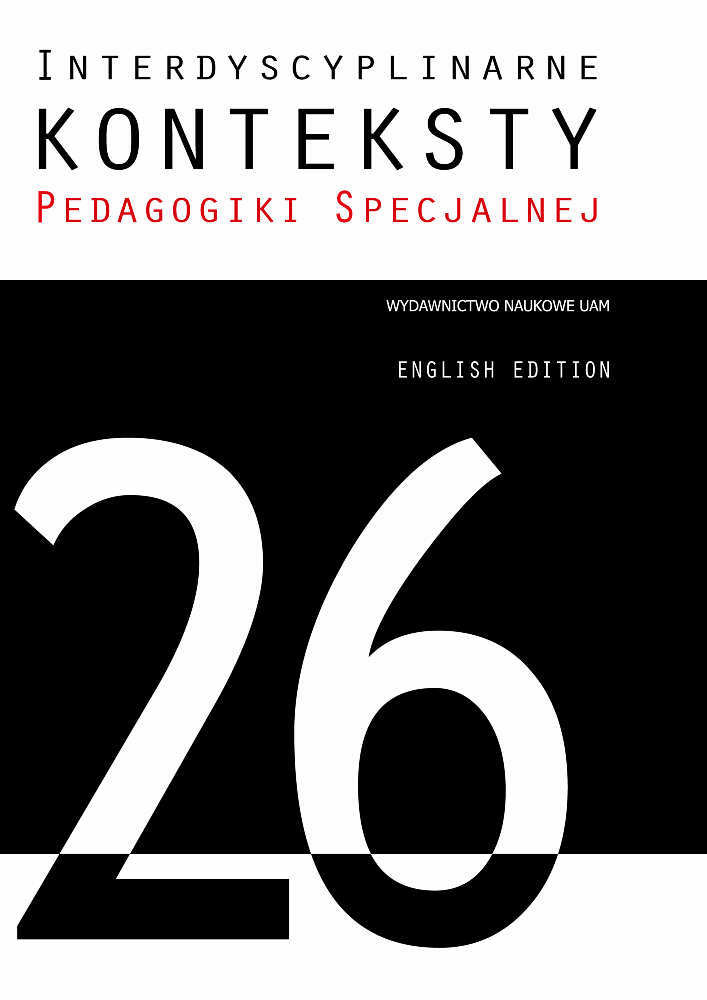Abstrakt
Katarzyna Parys, Sławomir Olszewski, Demanding disability – an analysis of opportunities and threats related to the functioning of people with mild intellectual disabilities. Part 1. Interdisciplinary Contexts of Special Pedagogy, no. 26, Poznań 2019. Pp. 15–38. Adam Mickiewicz University Press. ISSN 2300-391X. e-ISSN 2658-283X. DOI: https://doi.org/10.14746/ikps.2019.26.01
The thesis considered in the article is the statement that mild intellectual disability is a demanding disability. Three dimensions were distinguished in the description of the situation of persons with a mild intellectual disability:
1. Attributes of the phenomenon of mild intellectual disability
2. Attributes of the population of people with mild intellectual disabilities
3. Attributes of selected elements of the mesosystem of people with mild intellectual
disabilities
The key phenomena for these dimensions were analysed. The ambiguity of these phenomena has become the basis for considering the opportunities and threats that they may pose. Due to the extensiveness of the issues raised, the issues discussed are presented in two parts. The present text is considers the first two of the dimensions listed.
Bibliografia
Firkowska-Mankiewicz A., Szumski G., Pedagogika specjalna i system kształcenia osób z niepełnosprawnościami w Polsce, [in:] Pedagogika specjalna, vol. 2, ed. by D.D. Smith, Wydawnictwo APS, Wydawnictwo Naukowe PWN, Warszawa 2008, pp. 319–346.
Gajdzica Z., Antynomie edukacji integracyjnej – od idei do praktyki, [in:] Integracja edukacyjna. Oczekiwania i rzeczywistość, ed. by M. Klaczak, Wydawnictwo Naukowe Uniwersytetu Pedagogicznego, Kraków 2010, pp. 8–19.
Jachimczak B., Społeczno-edukacyjne uwarunkowania startu zawodowego młodych osób niepełnosprawnych. Studium empiryczne z regionu łódzkiego, Oficyna Wydawnicza „Impuls”, Kraków 2011.
Communication of the general manager of the Polish Central Examination Board of August 20th, 2018 on the detailed modes of adaptation of conditions and forms of execution of exams of primary school eight-graders and the lower secondary school exam in the academic year 2018/2019, <https://cke.gov.pl/images/_KOMUNIKATY/20180820%20E8%20EG%20Komunikat%20o%20dostosowaniach.pdf> [access: 13.05.2019]
Communication of the general manager of the Polish Central Examination Board of August 20th, 2018 on the detailed modes of adaptation of conditions Demanding disability – an analysis of opportunities and threats 37 and forms of execution of exams confirming professional qualifications in the academic year 2018/2019 <https://cke.gov.pl/images/_KOMUNIKATY/20180820%20EZ%20Komunikat%20o%20dostosowaniach.pdf> [access: 13.05.2019].
Kościelak R., Psychologiczne podstawy rewalidacji upośledzonych umysłowo, PWN, Warszawa 1989.
Kościelska M., Upośledzenie umysłowe a rozwój społeczny. Badania uczniów szkół specjalnych, PWN, Warszawa 1984.
Olszewski S., Parys K., Rozumieć chaos. Rzecz o terminach i znaczeniach im nadawanych w pedagogice specjalnej, Wydawnictwo Naukowe Uniwersytetu Pedagogicznego, Kraków 2016.
Oświata i wychowanie w roku szkolnym 2015/2016, Statistics Poland, Warszawa 2016.
Oświata i wychowanie w roku szkolnym 2016/2017, Statistics Poland, Warszawa 2017.
Oświata i wychowanie w roku szkolnym 2017/2018, Statistics Poland, Warszawa 2018.
Parys K., Osoby z diagnozą upośledzenia umysłowego w stopniu lekkim – w kręgu pytań i odpowiedzi, [in:] Poznajemy ludzi z niepełnosprawnością, ed. by D. Gorajewska, Stowarzyszenie Przyjaciół Integracji, Warszawa 2007, pp. 11–23.
Regulation of the Polish Ministry of Education of 14.02.2017 on the pre-school curriculum and the basic curriculum for primary schools, including for pupils with moderate or major intellectual disability, the curriculum of general education for industry branch-specific first level schools, general education for special schools preparing for work and general education for post-secondary schools, Polish Journal of Laws of 24.02.2017, item no. 356.
Regulation of the Polish Ministry of Education of 13.03.2017 on the classification of professions in vocational education, Polish Journal of Laws of 2017, item no. 622.
Regulation of the Polish Ministry of Education of 28.03.2017 on the framework curricula for public schools, Polish Journal of Laws of 31.03.2017, item no. 703.
Regulation of the Polish Ministry of Education of 9.08.2017 on the conditions of organisation of education, upbringing and care for disabled, socially maladapted and threatened by social maladaptation children and youths, Polish Journal of Laws of 2017, item no. 1578
Regulation of the Polish Ministry of Education of 9.08.2017 on the rules of organisation and provision of psychological and paedagogical aid at public preschools, schools and related institutions, Polish Journal of Laws of 2017, item no. 1591.
Sadownik A., Na rozstajnych drogach. Studium etnopedagogiczne kontrastowych karier szkolnych młodzieży, Wydawnictwo Naukowe Dolnośląskiej Szkoły Wyższej, Wrocław 2011.
Speck O., Niepełnosprawni w społeczeństwie. Podstawy ortopedagogiki, Gdańskie Wydawnictwo Psychologiczne, Gdańsk 2005.
Stobart G., Czy psychologia potrafi uzasadnić ideę integracji dzieci o specjalnych potrzebach?, [in:] Integracja dzieci o specjalnych potrzebach. Wybrane zagadnienia etyczne, ed. by G. Fairbairn, S. Fairbairn, CMPPP, Warszawa 2000, pp. 49–63.
Szumski G., Integracyjne kształcenie niepełnosprawnych, Wydawnictwo APS Wydawnictwo Naukowe PWN, Warszawa 2009.
